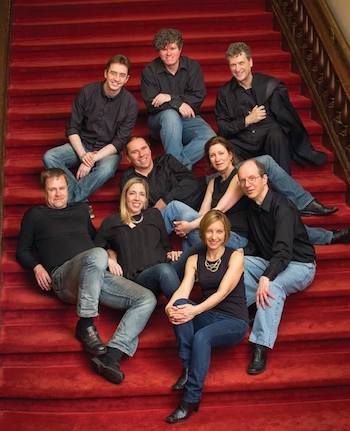Concert Review: Worcester Chamber Music Society’s “Time Changes”
By Jonathan Blumhofer
Now in its 18th season, the Worcester Chamber Music Society’s membership has remained remarkably consistent, boasting a number of familiar faces from Boston’s chamber music and orchestral scenes.

The Worcester Chamber Music Society. Photo: courtesy of the artist
How many layers of meaning might one read into the title of Sunday afternoon’s concert from the Worcester Chamber Music Society? On the one hand, Time Changes could refer to the shift of seasons. Or, perhaps, the music: there was no shortage of alterations of meter in the program’s selection of pieces by Paul Ben-Haim, Aaron Copland, Igor Stravinsky, and Claude Debussy.
Then, again, maybe the appellation was a clever reference to the group, which was opening its 18th season this weekend. Despite the passage of years, the membership has remained remarkably consistent, boasting a number of familiar faces from Boston’s chamber music and orchestral scenes.
Sunday’s performance at Assumption University’s Jeanne Y. Curtis Hall largely benefited from the sense of trust and musical community that’s been built up over the years: Copland’s angular 1937 Sextet and the suite from Stravinsky’s L’Histoire du Soldat require nothing less.
Neither, for that matter, does Ben-Haim’s 1952 Serenade for flute and string trio. The three-movement piece is steeped in the Munich-born Israeli composer’s idiosyncratic language, in which competing European styles (primarily fin de siècle German and French influences) are merged with appealing folkloric Middle Eastern gestures.
On Sunday, the latter — especially the first movement’s delicate bent notes and the finale’s soulfully dancing episodes — proved beguilingly atmospheric. Tracy Kraus dispatched the flute part with silvery tone while the string ensemble (violinist Krista Buckland Reisner, violist Rohan Gregory, and cellist David Russell) offered spacious support and, when called for, episodes of robust argumentativeness.
The conversational aspect of Copland’s Sextet is a bit more treacherous. An adaptation of the composer’s Symphony No. 2, the chamber version aims to simplify some of the demands of the original, which evidently proved a minefield for orchestras of the 1930s (the conductors Serge Koussevitzky and Leopold Stokowski both passed on the piece owing to its rhythmic challenges).
Whether the Sextet really simplifies the Symphony’s issues is an open question. The reduced ensemble of clarinet, string quartet, and piano certainly condenses them and, on Sunday, the WCMS navigated its precipices with a spunky assurance that grew as the reading proceeded.
What was particularly striking about the group’s interpretation was the lyrical warmth with which they fired the piece. Copland at his modernist best can be plenty astringent, but this weekend’s performance didn’t settle for just that. Instead, the approach clearly pointed the way (in tone, at least) toward his later populist style, particularly in the central Lento.
Not that the larger reading lacked for shrillness or edge as needed: clarinetist Eric Thomas wailed away in the finale. Randall Hodgkinson’s account of the piano part was invigoratingly incisive. Throughout, too, the low strings — violist Peter Sulski and cellist Russell — anchored the proceedings in velvet.
For pure acid, one had to wait for the Stravinsky, which reworks (for a trio of clarinet, violin, and piano) five movements from the composer’s bare-bones 1918 theater piece about a soldier selling his magic violin to the devil.
It’s caustic, though frequently playful, stuff. On Sunday, the opening “Marche du Soldat” trotted along cheekily. So did the “Petit concert,” with Hodgkinson’s pianism fleetly carrying the day. Sulski (this time on violin) and Thomas brought raucous energy to the “Danse du Diable.”
While the performance didn’t salvage the “Rag” (from the penultimate “Tango-Valse-Rag”), it wasn’t the ensemble’s fault: that genre simply can’t be abstracted, at least not after Stravinsky’s manner. If nothing else, it was a welcome reminder that geniuses also have off days.
Debussy wasn’t having one of those, however, when he wrote his String Quartet. Completed in 1893, this is music of lush beauty as well as compositional rigor. Both of those qualities emerged regularly on Sunday, especially in the Andante, which unfolded in a state of dreamlike concentration.
Jonathan Blumhofer is a composer and violist who has been active in the greater Boston area since 2004. His music has received numerous awards and been performed by various ensembles, including the American Composers Orchestra, Kiev Philharmonic, Camerata Chicago, Xanthos Ensemble, and Juventas New Music Group. Since receiving his doctorate from Boston University in 2010, Jon has taught at Clark University, Worcester Polytechnic Institute, and online for the University of Phoenix, in addition to writing music criticism for the Worcester Telegram & Gazette.
